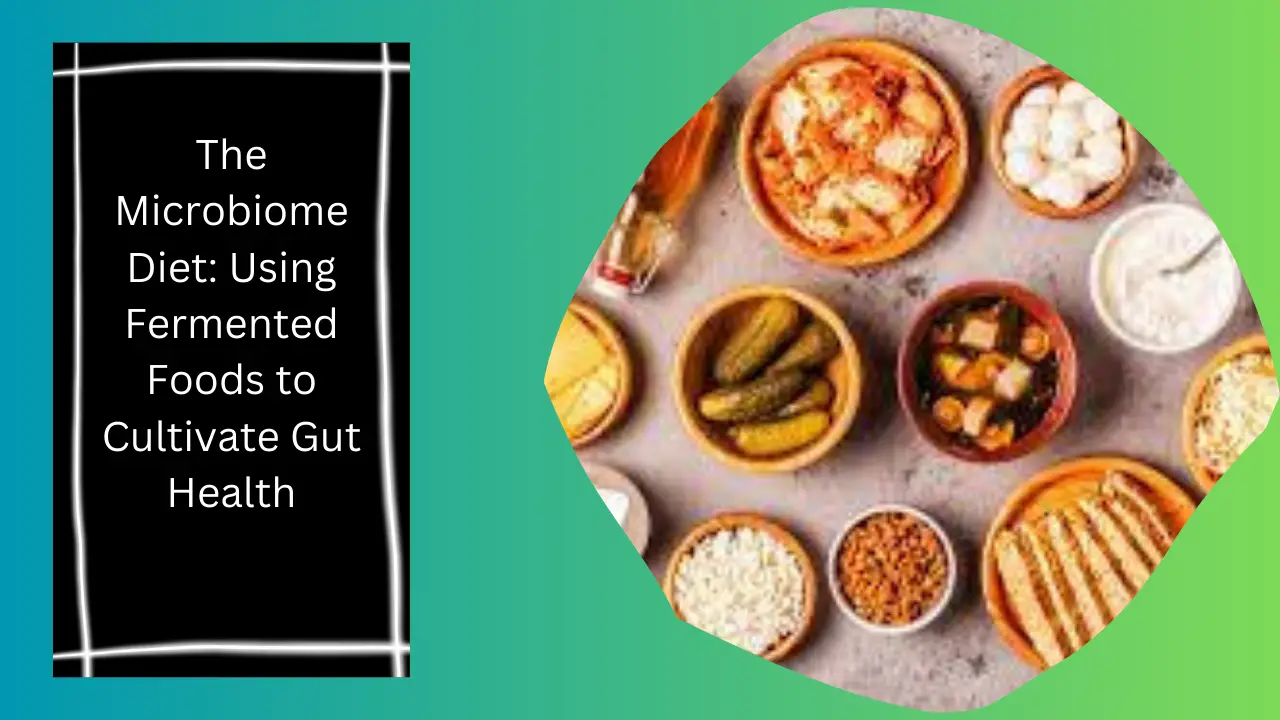
TrendPlain 16oz Olive Oil Dispenser for Kitchen - 2 in 1 Olive Oil Dispenser and Oil Sprayer - Olive Oil Dispenser Bottle w/Stickers - Olive Oil Sprayer for Cooking Black (Light Blockage)
$14.99 (as of July 26, 2024 07:34 GMT +00:00 - More infoProduct prices and availability are accurate as of the date/time indicated and are subject to change. Any price and availability information displayed on [relevant Amazon Site(s), as applicable] at the time of purchase will apply to the purchase of this product.)The Microbiome Diet: Using Fermented Foods to Cultivate Gut Health
The human body is a complex ecosystem, home to trillions of microorganisms living in and on us. This intricate community of bacteria, viruses, fungi, and other microbes is collectively known as the microbiome. It plays a pivotal role in maintaining our overall health and well-being, with a spotlight on digestive health.
Understanding the Microbiome
Before we dive into the microbiome diet, let’s explore what the microbiome is all about. Imagine it as a bustling city within your body, teeming with different types of inhabitants. These microorganisms are not freeloaders; they are essential to our survival. They help digest our food, produce vitamins, and even influence our mood through the gut-brain connection.
The Microbiome Diet Basics
So, what exactly is the microbiome diet? In a nutshell, it’s a dietary approach focused on nurturing a harmonious balance among the various microorganisms residing in your gut. As you’ll discover, this balance can have far-reaching effects, including potential weight management benefits. By following this diet, you’ll embark on a journey towards improved gut health.
Fermented Foods and Gut Health
At the heart of the microbiome diet are fermented foods. These are the superheroes of the dietary world, packed with probiotics that can help maintain a healthy gut environment. Fermented foods include yogurt, kefir, kimchi, sauerkraut, and kombucha, among others. Not only are they delicious, but they’re also rich in beneficial bacteria and essential nutrients.
Probiotics vs. Prebiotics
To understand how fermented foods work, we need to distinguish between probiotics and prebiotics. Probiotics are the live microorganisms found in fermented foods that provide a direct benefit to your gut health. Prebiotics, on the other hand, are dietary fibers that serve as food for these friendly microbes. Together, they form a dynamic duo for your gut.
Incorporating Fermented Foods into Your Diet
Now, let’s get practical. How can you incorporate these gut-loving foods into your daily meals? From adding yogurt to your morning routine to experimenting with kimchi in your stir-fry, there are countless ways to make fermented foods a delicious part of your diet. We’ll even share some mouthwatering recipes to get you started.
Benefits of the Microbiome Diet
The microbiome diet isn’t just a passing trend. Many people have experienced tangible benefits, from smoother digestion to bolstered immune systems. You’ll hear success stories that will inspire you to embark on your microbiome diet journey. But first, let’s address some concerns and myths.
Addressing Concerns and Myths
As with any diet, there are misconceptions and concerns surrounding the microbiome diet. It’s essential to separate fact from fiction and provide evidence-based information to empower your choices. Rest assured, we’ve got you covered.
Personal Stories and Testimonials
To make this journey more relatable, we’ll share personal stories and testimonials from individuals who have transformed their health through the microbiome diet. You’ll witness their journeys, including before-and-after anecdotes that highlight the diet’s potential.
Expert Opinions
For added credibility, we’ve gathered insights from nutritionists and doctors who specialize in gut health. Their expert opinions provide valuable guidance and perspective, ensuring you’re well-informed as you embark on your own microbiome diet.
Starting Your Microbiome Diet Journey
Ready to begin? We’ll walk you through the steps, from understanding the basics to creating a meal plan that suits your preferences and lifestyle. Remember, it’s essential to consult with a healthcare professional before making significant dietary changes.
Monitoring and Adapting Your Diet
As you progress on your microbiome diet journey, it’s crucial to monitor your body’s response and adapt accordingly. We’ll guide you on how to track your progress and make necessary adjustments to ensure your gut health thrives.
Success Tips and Tricks
To round off your education, we’ll share additional tips and tricks for success. From meal prep strategies to staying motivated on your diet, these insider insights will help you maintain a healthy microbiome for the long haul.
Frequently Asked Questions
- What exactly is the microbiome, and why is it important for my health?
- The microbiome is a diverse community of microorganisms that live in and on your body. It plays a crucial role in digestion, nutrient absorption, and even mood regulation.
- What are the potential benefits of the microbiome diet?
- The microbiome diet can improve digestion, support the immune system, and potentially aid in weight management.
- Can I follow the microbiome diet if I have dietary restrictions, like being vegan or gluten-free?
- Absolutely! The microbiome diet can be adapted to various dietary preferences and restrictions.
- Are there any side effects or risks associated with the microbiome diet?
- While most people experience positive effects, some may initially experience digestive discomfort as their gut adjusts. It’s essential to consult with a healthcare professional before starting the diet.
- How long does it take to see results from the microbiome diet?
- Results vary from person to person, but many individuals report improvements in their gut health within a few weeks to a few months of consistent adherence to the diet.
In conclusion, the microbiome diet offers a fascinating journey into the world of gut health and the incredible impact it can have on your overall well-being. By incorporating fermented foods and understanding the role of probiotics and prebiotics, you’ll be well on your way to cultivating a thriving gut microbiome. Remember, consult with a healthcare professional before making significant dietary changes, and enjoy the delicious and nutritious adventure that awaits you on the microbiome diet.








